COACHING RESEARCH STUDY
Leadership Coaching 2021
Reporting the Impact of Leadership Coaching on Executive Performance
Another Turbulent Year
As a premier leadership coaching firm that has helped hundreds of executive leaders achieve their performance goals and improve their well-being, Dion Leadership is committed to regularly researching and measuring the impact of our programs. Each year, we conduct a comprehensive research study of the leaders who have participated in one of our leadership coaching programs.
Our intention is to research and measure the effectiveness of our coaches and coaching programs while also gaining insights into how coachees are benefitting from coaching and the impact it is having on their organizations.
As our opening headline suggests, 2021 was another difficult year that required leaders to lead in new ways. From the transition to hybrid work arrangements to combatting the Great Resignation, leaders were once again put to the test.
With these themes in mind, we asked 162 recently coached executives to respond to our coaching research survey. We asked them to consider the impact their leadership coaching was having on their performance and their ability to lead their organization more effectively.

Study Participants
- Completed their coaching program within the last 2 years.
- Had a 40% response rate.
- Represented multiple industries (several from large manufacturing and healthcare organizations) and held a variety of jobs.
- Typically held the title of Manager, Director, Vice President, or C-level executive.
- Received between 3 and 25 individual coaching sessions that spanned in length from 3 to 12 months, or they received coaching as part of a comprehensive leadership development cohort program (typically a year in length).
What Is Leadership Coaching?
Leadership coaching is a targeted leadership development process designed to meet the unique needs of individual leaders. A leadership coach is a “thinking partner” whose specific purpose is to support the development of an individual’s personal and professional potential.
To create sustainable change, we follow a cognitive behavioral learning approach to coaching. This proven method helps a coachee explore situations with a new perspective, understand themselves differently, create new mindsets for approaching situations, and build new and more productive habits.
Our leadership coaches are typically previous executive-level leaders themselves. They have honed their leadership skills by leading others for decades before receiving a coaching certification. We select coaches who have strong emotional intelligence skills as a complement to their business and leadership aptitude and experience.
Our coaches use a proven coaching process. A key element that makes our coaching engagements so successful is our coach match method. We encourage all coachees to conduct “chemistry calls” and select a coach they find most appropriate.
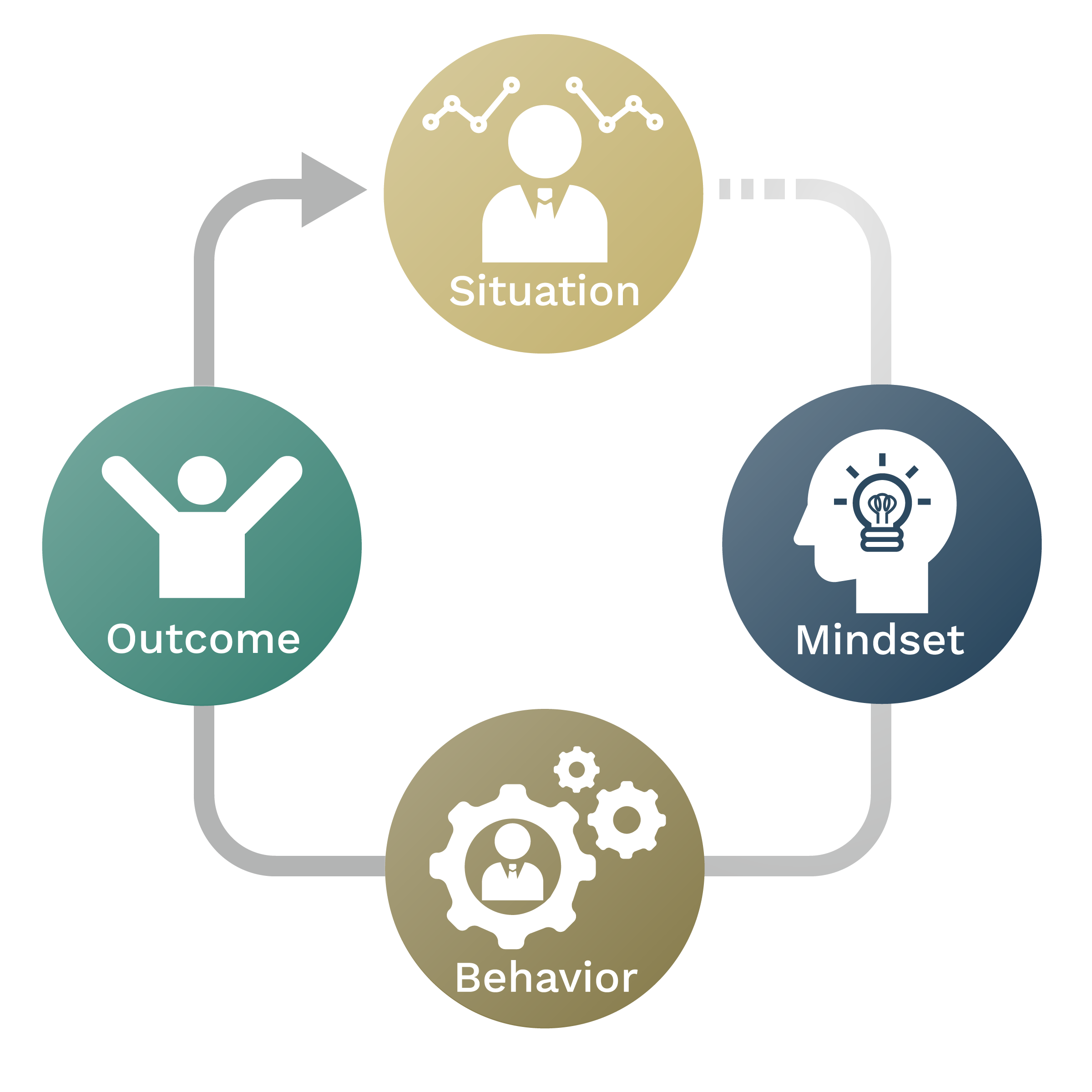
The Results
Coaching Improves Performance
Our survey included several reflective self-assessment questions. We wanted to understand the degree to which coaching positively impacts performance. Participants overwhelmingly reported that coaching helped them perform better in their current role. As you read the rest of this report, additional data will explain why they believe this to be true.
97%
… reported that leadership coaching provided insights that help them perform better in their role.
Behavior Change When It Is Needed Most
Coaching is not consulting. In leadership coaching, our goal is to help coachees expand their mindset, consider new and healthier ways of thinking, and ultimately change the way they respond to real-life situations. The same participants who reported improved performance also reported that they are better equipped to utilize new behaviors required of them at work.
In a year full of massive organizational transitions and disruptive societal change, it is especially important for leaders to be open to learning and utilizing new behaviors.
Coaching provides an opportunity for busy executives to pause, process their biases and destructive habits, and create new strategies and approaches to leadership. This is critical during times of epoch change when new skills and behavior are required for team and organizational success.
97%
… reported that as a result of leadership coaching, they are equipped to utilize new behaviors required of them at work.
73%
… reported that their overall well-being (stress, health, focus) has improved due to leadership coaching.
The Personal Impact on Well-Being
This pandemic required great dedication and resiliency from us as leaders. When leaders can be fully present at work and manage the day-to-day stressors inherent in middle, senior, and executive management life, everyone wins. While there are many work and life factors impacting someone’s stress level, coaching clearly makes a positive impact. In our survey data, 33% of participants strongly agreed and 40% agreed with the statement, “My overall well-being (stress, health, focus) has improved because of leadership coaching.” Only 3% disagreed, with the remaining 24% reporting a neutral response.
What Exactly Improved?
Changed behaviors led to improved organizational outcomes
We asked coaching participants to articulate the most impactful coaching focus areas, expressed as leadership behaviors, and then to identify specific organizational outcomes that resulted from the improvement of these leadership behaviors.
Sorted by the most selected behaviors, the following table shows the degree of impact each behavior had on the coachees’ effectiveness.
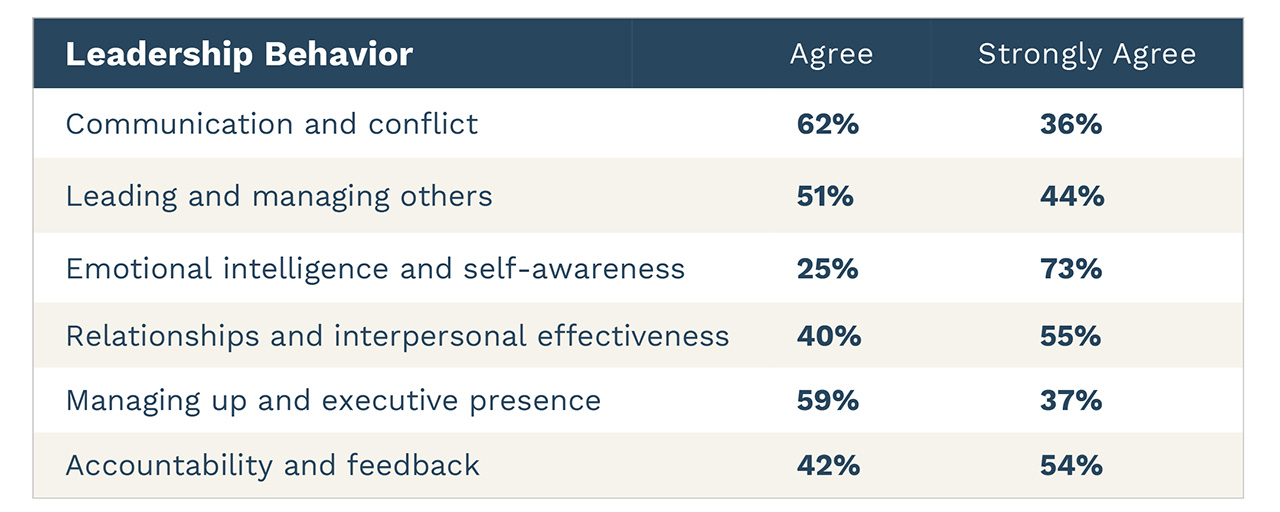
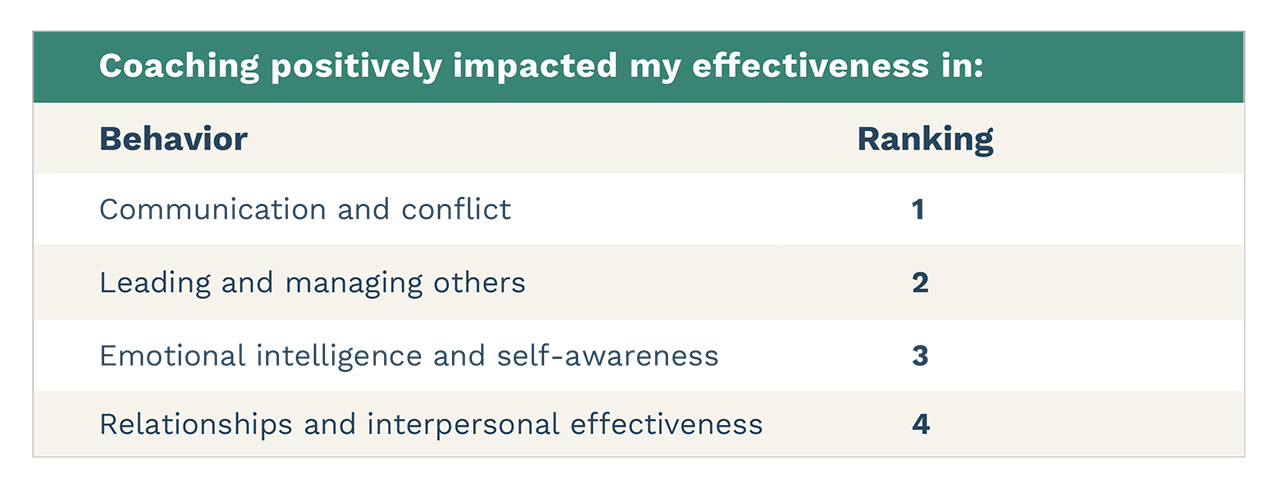
Of the four most-selected effectiveness areas, emotional intelligence and self-awareness was rated notably higher in its impact on effectiveness, with 73% strongly agreeing that it had a positive impact.
While self-reported improvements on leadership behaviors is desired and important, we ultimately want to see improvement in specific organizational outcomes. Organizations can directly quantify a return on their coaching investment from reported organizational outcomes. Below is a list reporting the percent of respondents identifying a specific organizational outcome improvement for each category.
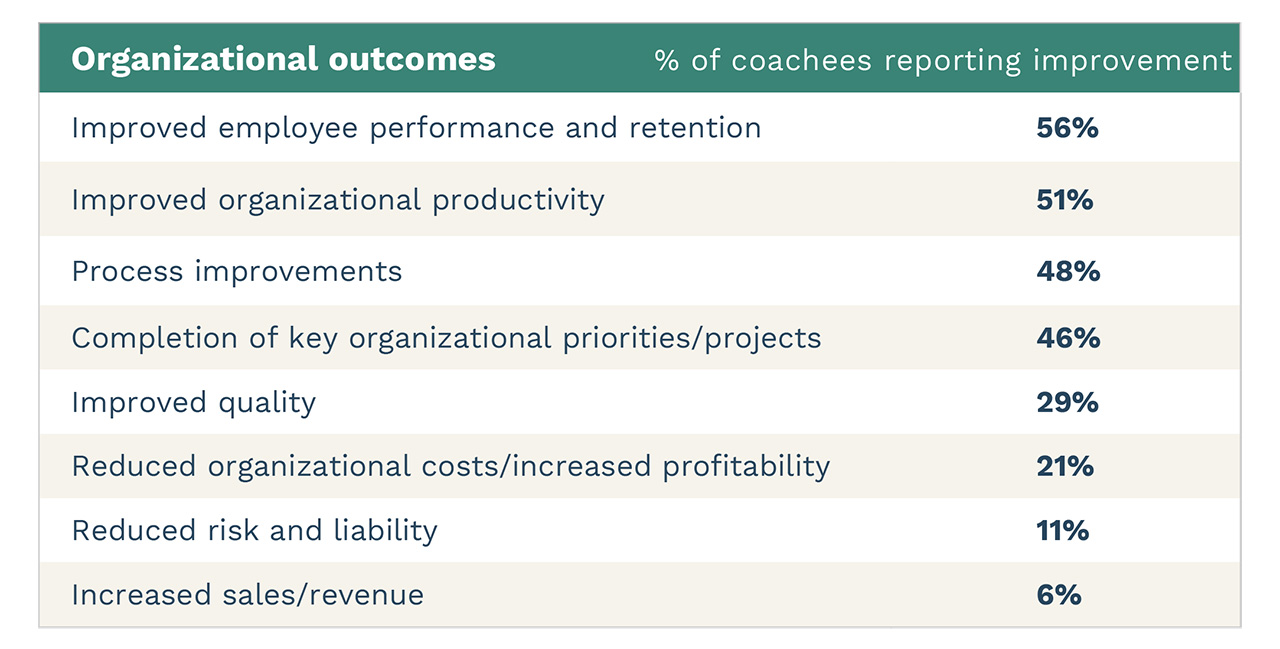
Other noted improvements included improved interactions between departments, reinforced organizational core values, and greatly improved morale within their team.
If I think I can . . .
Confidence is an important enabler of leadership success. Too much confidence, and the leader is a loose cannon, wreaking havoc throughout the organization. Not enough confidence, and they are too passive, watching the world pass by without directing the team or organization as needed. Leadership coaching assists leaders in finding their authentic voice and approach so they can lean into difficult situations, engage others, and make sound decisions.
97%
of participants in this study reported an improvement in their confidence as a leader as a result of their leadership coaching.
Counteracting the Big Quit
Retention is an important outcome of leadership coaching. Keeping just one key leader who was on the brink of leaving the organization can create a positive ROI, funding your entire yearly leadership development budget. In this confidential study, we asked our participants if coaching positively impacted their desire to stay with the organization.
We found that 72% of coachees agreed or strongly agreed that leadership coaching positively impacted their desire to stay with the organization.
We accredit the high rating that surfaced in the study to a few factors.
- The investment in time and money alone signals to the leader that the organization values them.
- Our coaching process focuses on improving the communication channels between the coachee and their leader, leading to increased clarity of job expectations.
- Coaching helps the coachee realize the role their own thinking and behavior play with struggles, challenges, and setbacks at work. Looking at situations from the viewpoint of others, unhooking from a typical victim mindset, and being proactive when something is not going their way helps the coachee regain engagement and commitment to the organization.
What’s the Plan?
Organizations choose to deploy leadership coaching for a variety of reasons. Each year we track and monitor if the development action plans change, signaling a shift in organization priorities or problems. Action plans are created after a thoughtful process of collecting self and 360 assessment information, conducting interviews with others, and meeting with the coachee.
Seeing trends in the coachees’ focus areas can help us better understand broader leadership development needs and spot trends in organizations. Below is a list of coaching development plan areas and the percent of coachees reporting these as part of their action plan.
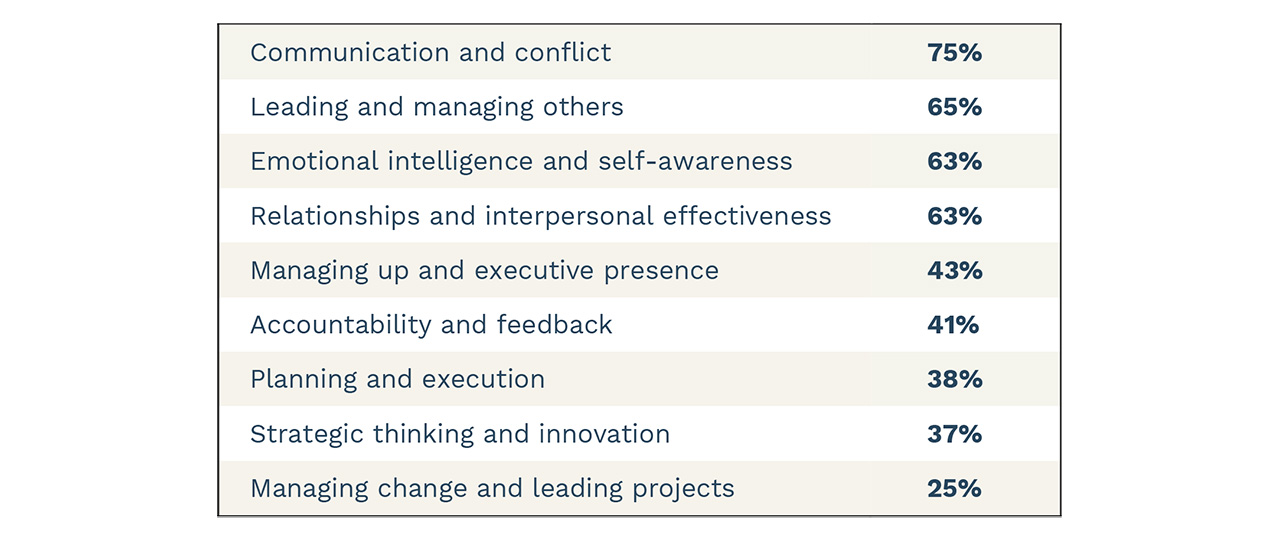
Other notable focus areas reported include confidence building, stress management, how to impact core values and create organizational alignment, and overcoming imposter syndrome.
Making an Impact
In the words of the coachees, below are reported examples of organizational improvements by category.
- Improved retention of high performers and direct reports
- Been promoted when boss retired
- More productive meeting with senior leadership
- Increased feedback and cross-communication with other departments
- Implemented project management tools that increased accountability
- Performing the same responsibilities with two fewer people
- Lost a manager and maintained historical productivity and output
- Ability to account for all steps in the process improvement cycle
- Improved accuracy
- Reduced overall scrap
- Less redundant meetings and improved communications
- Improved service delivery
- Won business award
- Improved job quality
- Received a promotion
- Successful transition to a new ERP
Net Promotor Score (NPS)
Customer satisfaction is important to all businesses. A leading standard to measure customer satisfaction is the net promoter score. We want raving fans of coaching, not only for our business but for the organizations that hire us to coach their most precious key resources.
Our calculated NPS score to the question “How likely are you to recommend leadership coaching to others?” is +72.
How does this stack up? NPS scores range from –100 to +100. According to SurveyMonkey’s global benchmark data of over 150,000 organizations, the average NPS is +32. For the professional services industry, the average is +43. We are delighted to be not only above the average but entering the top quartile for all professional services organizations.
72%
2020 NPS score
97%
I am most definitely or somewhat better equipped to utilize new behaviors.
What Has Changed?
We continue to see strong results in the areas of improved performance and new behaviors employed as a result of coaching. Specifically, the item “because of my leadership coaching, I am most definitely or somewhat better equipped to utilize new behaviors” improved from 93% to 97% year over year.
Last year, coachees reported their top coaching development plan item was to focus on the most important work. This year, the highest-reported area was improving communication and conflict.
Improving long-term perspectives and making better decisions was also rated higher last year than in 2021.
This anecdotally aligns with the challenges organizations were facing in 2020 compared to this year.
Holding steady in the top quarter of the list is a variety of interpersonal skills. One area that stood out this year at the top of the list was focusing on better leading and managing of others.
In the open-ended comments, resilience, focus, mindset, and well-being appeared more frequently this year than the prior year.
“This coaching has been the best thing that ever happened to me in my 27 years of working.”
Additional Thoughts
We asked all coachees to give us some additional insights to help us better understand the impact of their leadership coaching experience. After analyzing and categorizing the open-ended feedback, we have identified three trending themes.
The power of direct and honest feedback
- It was difficult to hear 360 feedback and some of the stakeholder interview feedback, but it was a necessary first step to help me be ready to receive the coaching. [Coach name] did an exceptional job in that period letting me absorb the feedback, feel all of it, but also let go of some of it. I found the tools (coaching intake, goals, summary) very helpful to keep the relationship on track and helped me achieve the goals I had for coaching. My coach was incredible.
- [Coach name] was prepared for every meeting. She asked powerful questions before and during our sessions that let me struggle with the growth and eventually pull myself up. It’s hard to put words to the impact she’s had on me—definitely one of the most impactful experiences in my life.
- My experience provided invaluable insights into my approach, opportunity areas, and strengths. My open, honest communication with my coach provided the “safe space” to work through extremely challenging issues.
- Speaking with my coach has given me an independent source I never knew I needed; it allows me to explore ideas and understand others better, whilst unlocking my leadership potential. Applying some of the actions in a fast-paced working environment has given direct results not only to the team but to my own work
mental health. - The conversations I had with a leadership coach were, for me, unlike conversations I’d had in any other arena. They allowed me to be candid in relation to things I feared and struggled with as a leader.
The coach and the coaching connection matter
- My coach was well versed in my organization; therefore, she was able to provide some insights into organizational leader personalities and politics.
- [Coach name] was an exceptional leadership coach . . . this experience made me a more impactful and better executive. Quite frankly, she challenged me to find my core values and beliefs . . . which has made me a better person and more satisfied in my leadership role. I am centered, grounded, and focus on what’s important.
- Personally, I think every executive needs and should have a coach, not just for onboarding purposes.
- [Coach name] was a wonderful leadership coach. He took a personal approach and was adept at switching gears based on what occurred in between coaching sessions. He did a great job of being available over email and phone calls so that I was able to get advice during “emergency” situations. He also helped me obtain a promotion by providing me with examples improving how I “manage up.”
- [Coach name] was an excellent coach. She guided me through all the processes in a smooth way. After we finished, I completely changed my thinking way about myself, my co-workers, and the company.
Each coachee has a unique coaching need
- The coaching I received through Dion leadership helped me become a more mentoring leader as well as a better listener. Listening to my team not only helped me with what they needed from me but also helped them learn and become more independent.
- I am personally much more confident and empathetic. Tough conversations have become much easier and effective. How and what to communicate and employee well-being are first thoughts.
- Increased confidence, ability to feel more comfortable in my own skin as a leader, ability to think more strategically prior to having conversations with senior leadership.
- The coaching helped with prioritizing work and allowing for focus time. It validated that I should not worry so much about the things I can’t control, to be more present without the stress.
- I wish everyone could have a coach. It really changed the way I look at things and caused me to take a more introspective (and outward mindset) approach.
- Leadership coaching allows me to test new ideas and concepts with someone with valuable experience and insights with no vested interest in the subject matter.
- Thanks to [coach name], I have better relationships with my boss, Japanese staff, coworkers, and my employees. Again, it really changes 180 degrees my overall perspective about my responsibilities and how I can change all around me: clear strategies, good communication, coaching and listen, listen & listen.
- My coaching experience provided me with tools that I can still utilize to this day. Increased self-awareness and emotional intelligence, conflict resolution, managing stress—all benefits which make me a more well-rounded person and employee for the organization.
- I can say this coaching has been the best thing that ever happened to me during these 27 years working; it really helped me to improve my managerial skills, but mainly my personal behavior (emotional intelligence).
Industry Differences
We analyzed the data by the largest industries we surveyed, manufacturing and healthcare. For most areas, there are great similarities between industries. However, the following are the most notable differences:
- Manufacturing coachees selected Leading and Managing Others as a coaching objective
at a far greater frequency. (80% vs 30%) - Healthcare coachees selected Managing Up and Executive Presence as a coaching objective
at a far greater frequency. (60% vs 32%) - Manufacturing coachees reported a stronger improvement in Relationships
and Interpersonal Effectiveness. (60% vs 33%)
In Closing
Simply put, coaching participants report substantive improvements in the way they behave, leading to better organizational outcomes. Participants utilized coaching to improve their ability to lead others, communicate more effectively, engage in healthy conflict, and improve their emotional intelligence.
These personal and professional gains enabled these leaders to retain key staff, hold others accountable to achieve stronger individual performance, build and empower teams to achieve stronger results, and improve business performance, including sales, quality, and production.
The fallout from the pandemic is far from over. Leaders are learning to develop new skills to lead in a hybrid work environment and create conditions to attract and retain talent. If you would like support so you or your leaders can receive the benefits shown in this study, reach out to us. Our team of experienced executive coaches can help.

Give the Gift of Coaching
If you too are sold on the power of coaching, but are having trouble getting others to understand it is worth the investment and time, feel free to share the study with them. You can also find more information about our coaching programs on our website.
If you have any questions about this research study, wish to have others coached in your organization, or if we can be of help with other leadership development or culture needs, please schedule a time to talk with me or a member of our team.

![]()
Steve Dion
Founder & CEO
Steve@DionLeadership.com
248-417-5895
